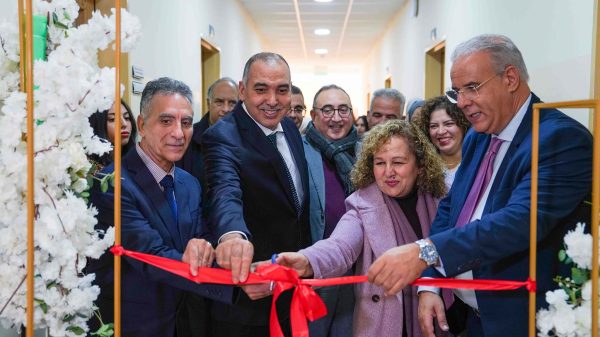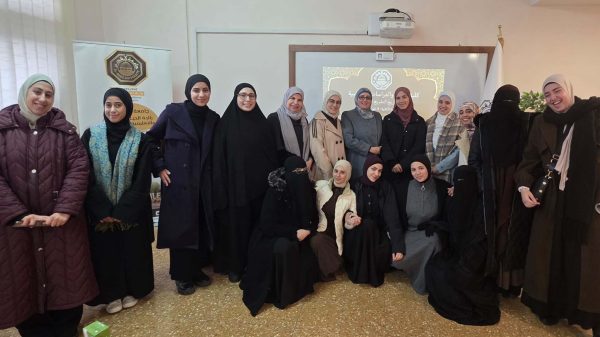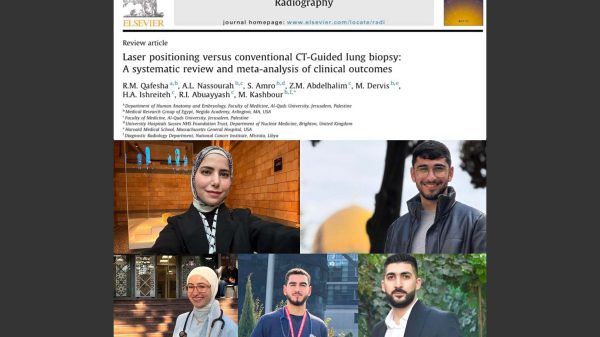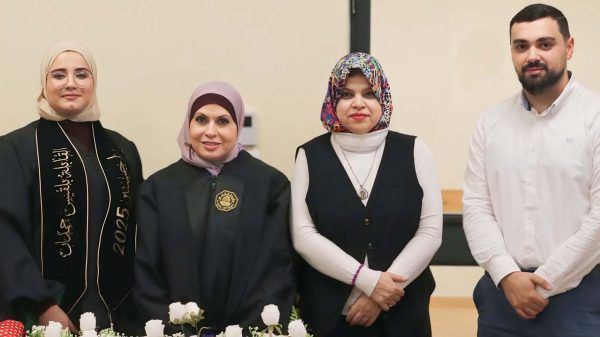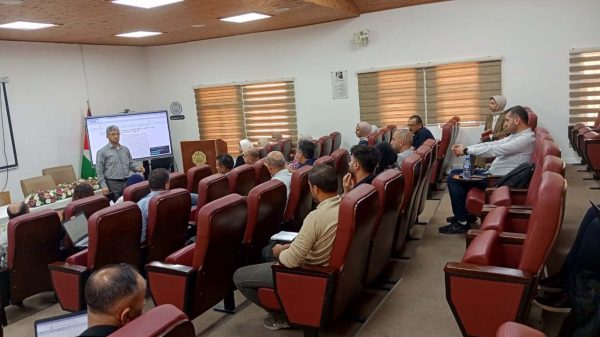Surroundings / The forced ecology of occupation
Palestinian architect Omar Yousef finds politics in even the most technical of matters.
By Esther Zandberg
Palestinian architects are often asked to draw inspiration from the grand Islamic architectural tradition and the local cultural heritage, said Palestinian architect Omar Yousef, with a hint of sarcasm.
His local heritage is not the Alhambra palace or Istanbul mosques, but rather the crowded cityscale of Silwan, East Jerusalem, where he grew up, and Shuafat, where he now lives and works, he said. It is an architecture of chaos, crowdedness, instability, temporariness and destruction, improvised building additions and a separation fence. It is an architecture of discrimination, control and supervision.
"This aesthetic is not necessarily an expression of weakness," said Yousef, "but an authentic reaction to necessities, a testimony to the survival instinct of Palestinian society. It is architecture of constant opposition, and may not be beautiful by Western standards, and the materials may not suit the local climate, but it manages to create a human environment. It gives me faith in our ability to survive."
He calls the style he fashioned from these sources of inspiration "the cacophony of a refugee." The Ramallah Red Crescent building he designed encapsulates this spirit: a non-stylized mixture of styles, coatings and surfaces, walls slanted at random angles.
He believes the shape of a building relates to its history and presents its message.
"I feel a need, an obligation, to use my architecture to create endless opposition. Beyond being part of a society under occupation, I am part of a society in constant opposition. The message behind this opposition to the Palestinians is 'Okay, we had a tough time, but the time has come to pick up the pieces and do something with it, to make your collage, our collage.'"
Yousef, a professor and the head of the graduate program in Jerusalem Studies at Al Quds Palestinian University in Jerusalem, is a guest of the annual Ecoweek conference on green architecture, community and sustainability in the Middle East, being held in Israel this week. He is a prominent figure in the Israeli-Palestinian architectural discourse, which flourished briefly in the euphoria of the Oslo Agreement.
He is uncompromisingly critical: "Is an Israeli planner no more than a military man in disguise who is continuing the war over the drafting table?" he asked rhetorically during an interview, but he is also prepared to engage in dialogue.
His voice should be heard beyond the limited forum of architects who attend cooperation conferences and are already part of the choir. He is an active member of the Jerusalemite Palestinian organization, the International Peace and Cooperation Center, which was established in 1998 in order to promote civil empowerment among Palestinian society regarding planning in Jerusalem, while leaving ending the occupation or "normalization" out of the discussion.
Yousef predictably added political and social element to the ecological conference, ostensibly a professional, technology-oriented matter. The program stated he would speak about a neutral, environmental subject: "Water Conservation in Houses in Gaza."
In an interview before the conference, he gave an indication of his course: He was curious, or rather skeptical, "whether it would be just another Israeli conference with a little Palestinian decoration, like it used to be, in the days of Oslo." And judging by the first day of the conference at Tel Aviv University, it is hard to say any prominent Palestinian presence has been felt.
"Even though I noticed that in Israel they have been talking a lot about ecology lately, it is impossible to talk about this without addressing the conflict," he said.
He ultimately called his lecture "Recycling Water in Gaza: Discrepancy between Sustainable Ecology and the Occupation." It met all the expectations.
From a different place
"I listened to the lectures before mine," Yousef began his lecture. "It was interesting, I learned a lot. But I am amazed by the 'normalization.' Everything here is going so well. I came from a different place, from the place of the wall, and when you have the occupation around your neck, thinks look different."
There, ecology looks less "green" and a lot more political than people are willing to admit. Many Palestinians oppose ecology, Yousef said; they see it as a symbol of the occupation. Palestinian water consumption per person is on average three times less than Israeli per capita consumption, according to a report by B'Tselem, the Israeli Information Center for Human Rights in the Occupied Territories.
"They are ecological involuntarily, but they are not willing to accept the environmental principles because they say they do not want to save resources for the occupation. So the occupation provides justification for rejecting sustainable environmental principles, and both the Palestinians and the Israelis are its environmental victims," he said.
Ironically, Gaza's population is also very ecologically aware, involuntarily, and the consumer world could learn from it, he said. For lack of conventional building materials, they build houses out of mud and straw. For lack of waste disposal sites, they use junk to build playgrounds for children and recycle overflowing sewerage for irrigation and watering vegetable plots (permaculture ), said Yousef.
"They have extensive experience with waste," he said.
At the conference, he presented ecological infrastructure ventures, water and waste recycling projects he promoted in Gaza in collaboration with local communities, back when he could still enter the Gaza Strip.
"It is architecture during a siege, not high-tech ecological architecture. There are no materials, there are no supplies and this was even before Hamas rose to power in Gaza," he said.
Yousef refers to Hamas' victory in spatial terms.
"The discourse of the establishment after Oslo was about two nations for two peoples, but reality held a pockmarked, non-contiguous space," he said. "Without sovereignty and supervision of resources, it was very difficult to traverse this space, islands in the sea of Israeli rule, and this caused total despair."
The Palestinian urban ecology is "islands of Area A and Area B floating in a sea of Area C under Israeli control. Even if the Palestinians have the money and knowledge to repair leaky water infrastructure and failed sewage systems, if they do not receive Israeli permission, what good does it do them? So ecological technology is not the main issue here," he said.
Think of Bat Yam
Yousef, 54, studied architecture and worked in Bucharest and Berlin. He received his doctorate from the University of California.
"I fled there after the great disappointment with Oslo, and after the second intifada," he said. His doctorate was about "the urban morphology of conflict," and focused on Jerusalem.
In the spirit of the International Peace and Cooperation Center, Yousef also believes planning is a central issue of the conflict, and that immediate results are needed "before political achievements and a comprehensive resolution of the conflict."
The center is working to change urban master plans, prevent home demolitions, and find where Palestinian homes could be built legally. "We still believe there is a window of opportunity," he said.
Many Palestinians say that as early as the Madrid Conference, they knew negotiations would go on forever, said Yousef, "and in the end, a solution would be imposed on the Palestinians based on what's convenient for Israelis.
"I am a little more optimistic than that. I believe that if we become more familiar with the method, we can break the barrier of not speaking with the ruling powers, and perhaps enable legal alternative planning and construction. If the Palestinians know their urban and civil rights, they will have successes, perhaps in the Supreme Court.
"In Jerusalem we pay 33 percent of the city's municipal taxes, so we have legal rights. I don't hope for huge successes, but we cannot skip this stage, even it serves only as a critical standpoint."
Palestinian architects currently design mainly small projects – lots of renovations and private homes, "the kind that every high school graduate can design," he says. They have hardly ever been involved in master plans, certainly not in plans that were approved.
The most important building his firm designed is the Qattan Library and Children Center in Gaza City, after winning a design competition. The center was dedicated in 2005 and includes a library, information center and theater. At the heart of the structure is an indoor street inspired by a Mediterranean bazaar, a local and personal interpretation of traditional and modern architectural archetypes, he says.
Yousef, an Israeli resident, cannot enter Gaza, and has not seen the completed building. He saw from the photos that the building escaped destruction during Operation Cast Lead.
Yousef will participate today in another Ecoweek green panel in conjunction with the second international Biennale of Landscape Urbanism in Bat Yam, titled "Urban Space: Time, Economics and Ecology." The event is being held at Mirpesset, on the Bat Yam beach at 17 P.M.
Yousef has only limited familiarity with Bat Yam, which is not directly associated with the conflict. Nevertheless, he is raising a subject that no one has dared to touch until now.
"The situation of Bat Yam and Jaffa is a little reminiscent of Nazareth and Upper Nazareth," he says. "Israeli Palestinian residents from Jaffa will move to Bat Yam, if they are not already doing so now, because it's less expensive there. So we need to think about this in order to prevent future friction and to accept the process as an opportunity to enrich the demographic and ecological diversity in Israel-Palestine. Social ecology is not just recycling water."




